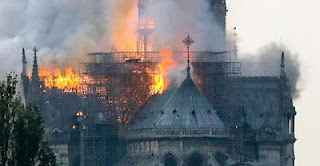One of the challenges religion has faced throughout human history has been being subordinated to politics. This may have a heightened salience right now in regard to the Orthodox Church's past and present relationship to the governing power in Russia, whether it was the Tsar or Stalin in the past or Putin in the present. Manifested in very different ways, however, this issue arises also in the traditionally Latin-Christian West, where political parties have been known to embrace or at least identify with certain forms or aspects of the Christian past.
So it was with great interest that I recently read an article* on how certain European right-wing parties have increasingly embraced Christianity as a national/civilizational identity marker but largely without any corresponding embrace of religious belief or practice and even framing Christianity as itself somehow secular and democratic, especially in contrast with Islam and Muslim immigrants. The parties which the authors examine are those in Austria, Belgium, Denmark, France, Netherlands, Norway, Sweden, and Switzerland. While those parties are different from one another in various respects, they can all be more or less characterized in the above manner - "in contrast to their far-right counterparts in the U.S., Hungary, or Poland, which lack the same liberal-civilizational emphasis."
Following social science literature, the authors highlight the concept of populism as an ideologically flexible anti-elitist politics, "resting on a vertical juxtaposition between a virtuous and. homogeneous 'people' on the bottom and a corrupt and self-serving 'elite' on the top." Such populism is also typically anti-pluralist, in that the extolling of "the people" involves exclusion of others, e.g., immigrants and other minorities. Religion is relevant to such populist discourse in that it offers "a rich and unique array of culturally specific resources," more so than "other nativist identity markers."
What appears so striking about this rediscovery of Christianity and Europe's Christian cultural heritage is the fact "that Christian belief and practice has been in decline for decade in Europe, and that the eight countries where these parties hail from are among he most secularized societies on earth." Moreover, with recent changes in popular moral attitudes, political movements have had to adapt accordingly, thus severing pervious linkages between religion and the more traditional conservative politics. "Rather than a source of morality, Christianity here becomes a secular appeal to shared ancestry, heritage, memory, and a nativist conception of groupness" - even to the point of "arguing that Christianity itself is a worldly and progressive religion, which helps to create a contrast with the uncivilized qualities they ascribe to Islam."
Unsurpisingly, the authors note that this has sometimes resulted in conflict between such parties and traditional churches. Examples cited are Marine Le Pen telling the Pope to stay out of French affairs, as a result of the Catholic Church's embrace of refugees, and the Austrian FPO's characterization of the Church itself "as part of the elite establishment." Thus, "many Catholic and Protestant clergy members have been outspoken in their criticism of these parties for appropriating religion for exclusionary purposes and for electoral opportunism." Thus, unlike more traditional Christian-Democratic parties, "meaningful references to Christian belief, doctrine, practice, theology, or values are marked by their sheer absence."
In contrast, American, Polish, and Hungarian populists "embrace Christianity with relatively stronger references to faith and doctrine, and as a key asset to mobilize socially conservative groups and policies." Their rhetoric is thus "more strictly nationalist." Obviously, that is a very important difference. Indeed, unlike the European counterparts considered in the article, U.S. right-wing populism has publicly retained certain traditional Christian moral proscriptions (largely in relation to abortion and homosexuality but dramatically less so in other areas, such as divorce). That said, it seems increasingly evident that the religious component itself is increasingly subordinated to the political pursuit of such culture war conflicts. Traditional religious belief and practice seem to continue to decline in the U.S. - contrary to what was widely believed only a few decades ago. Yet it continues to play a part in public political conflict like its European counterparts, although significantly without the latter's "liberal-civilizational emphasis."
*Finding Religion: Immigration and the Populist (Re)Discovery of Christian Heritage in Western and Northern Europe at:
https://www.mdpi.com/2077-1444/13/2/158?utm_campaign=releaseissue_religionsutm_medium=emailutm_source=releaseissueutm_term=titlelink21
Photo: Notre Dame de Paris on fire in 2019. While itself unrelated to the issue of Neo-Christian European Populism, I think this image serves as a particularly vivid pictorial symbolic expression for the precarious state of the Church in increasingly post-Christian societies.


No comments:
Post a Comment